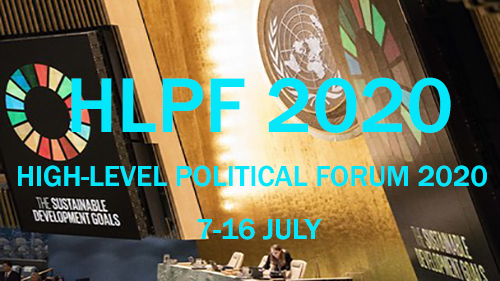ASPBAE Calls for meaningful outcome of the 2020 HLPF amidst COVID-19

The year 2020 is a pivotal one. It marks the fifth year of the implementation of the 2030 Sustainable Development Agenda and ushers in the final decade of action and delivery.
The HLPF will be held from 7 to 16 July 2020, under the auspices of the Economic and Social Council (ECOSOC). The Forum will be held virtually as the world grapples with the profound impacts of the COVID-19 pandemic, which affect the spheres of health and well-being, livelihoods and the economy, and education and learning.
The Asia South Pacific Association for Basic and Adult Education’s (ASPBAE) is committed to continuing its strong engagement with the HLPF processes in 2020, towards ensuring equitable and inclusive quality education and lifelong learning opportunities for all, especially at this time of crisis and beyond.
The 2020 HLPF will take stock of the status of and the progress in the SDGs and the ways forward in light of the COVID-19 crisis. It will also discuss how the international community can respond to the pandemic and the numerous challenges it poses with the aim of getting back on track to achieve the SDGs and accelerate progress during the final decade.
Informed by the findings of the 2019 Global Sustainable Development Report (GSDR), the HLPF will take up the theme “Accelerated action and transformative pathways: realizing the decade of action and delivery for sustainable development.”
It will include thematic sessions on the six transformative entry points identified in the 2019 GDSR, the first of which is on “Human well-being and capabilities,” which will be addressed in the thematic review on Advancing human well-being that shall “focus notably on various trade-offs and synergies related to improving human well- being, and more particularly ending poverty in all its forms and dimensions.”
The first entry point looks at key SDG well-being and capabilities goals, one of them being Goal 4 on quality education, alongside Goals 1 (no poverty), 2 (zero hunger), 3 (health and well-being), 5 (gender equality), 6 (clean water and sanitation), 7 (affordable and clean energy), 15 (life on land), and 16 (peace, justice and strong institutions).
ASPBAE notes that education, health and social protection play critical roles in building human
capabilities and in empowering people to exercise their rights, enabling them to participate meaningfully and responsibly in the social, economic, political, and cultural pursuits that better the conditions of their respective communities and the larger society. Human well-being and capabilities are at the heart of the transformations as envisioned in the 2030 Agenda. Investing in human capabilities, particularly in education, health, and social protection are key strategies toachieve decent work and sustained livelihood, promote peace and social justice, address inequality, and pave the way for sustainable and just economic growth.
As part of its continuing engagement on Sustainable Development Goal 4 and the broader 2030 Agenda for Sustainable Development, ASPBAE, its members, and national education coalitions actively participated in the HLPF and Voluntary National Review (VNR) processes, including the preparations of civil society organisations (CSOs) that were organised at the regional level.
In this regard, ASPBAE organised several virtual meetings with national education coalitions from countries doing the VNR this year, specifically the Coalition for Education Solomon Islands (COESI), Samoa Education Network (SEN), PNG Education Advocacy Network (PEAN), National Coalition for Education-India (NCE-India), Campaign for Popular Education-Bangladesh (CAMPE), National Campaign for Education- Nepal (NCE), and Association for Adult Education-Kyrgyzstan (AED).
ASPBAE, its members and affiliated national education coalitions have been particularly active in drafting CSO positions that will be delivered after the presentations of the VNRs. Representatives of these coalitions were part of the Drafting Committee, tasked to finalised the CSO positions.
ASPBAE and the seven national education coalitions are set to launch the Civil Society Key Messages on SDG 4 in the lead-up to the presentations of the VNRs from 10 to 16 July 2020. These Key Messages were the result of consultations among coalition members and their constituencies done virtually in most of these countries.
On the occasion of the opening of the 2020 HLPF, ASPBAE, its members and affiliated coalitions reiterate its calls for concrete actions necessary to bring about transformative changes in education as the world copes with and struggles to recover from the COVID-19 pandemic. We call on Member States, the United Nations and the global community to build stronger, better and safer public education systems that are equitable, inclusive, gender-responsive, learner-friendly, resilient, and transformative.
We also underscore the need to protect public education budgets, ensuring that education is not de-prioritised in the budgets of governments and is included in the support extended by donors and development partners. Finally, we appeal for greater spaces for more meaningful civil society participation, monitoring and engagement in SDG and VNR processes at global, regional and national platforms.
ASPBAE stands in solidarity with the global community and extends its best wishes for the successful outcome of the 2020 High-Level Political Forum.





